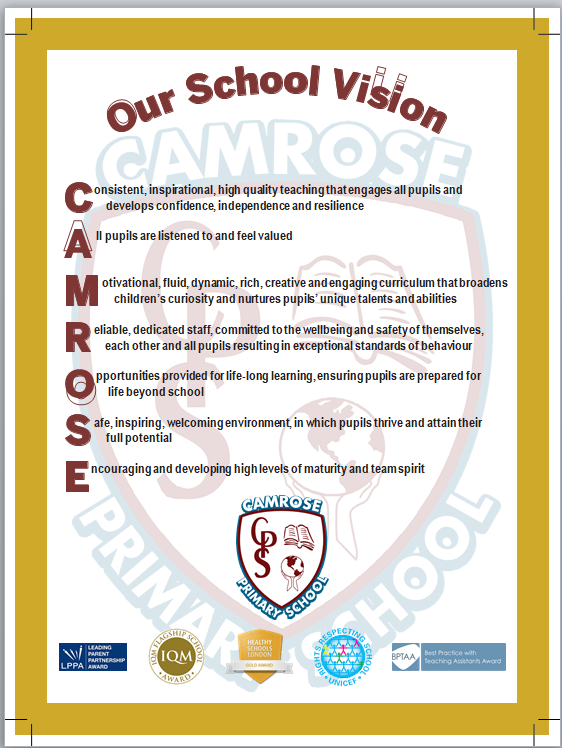Values & Ethos
Aims & Values
The aim of Camrose Primary School is to provide opportunities for children to develop as independent, confident, successful learners with high aspirations who know how to make a positive contribution to their community and the wider society. There is a high focus on developing children’s moral, spiritual, social and cultural understanding. We aim for all learners to enjoy their education and make very good progress in all areas of learning. Pupils at all levels are helped to achieve their potential.
Promoting British Values at Camrose Primary School
The DfE have recently reinforced the need “to create and enforce a clear and rigorous expectation on all schools to promote the fundamental British values of democracy, the rule of law, individual liberty and mutual respect and tolerance of those with different faiths and beliefs.”
The government set out its definition of British values in the 2011 Prevent Strategy, and these values have been reiterated by the Prime Minister this year. At Camrose these values are reinforced regularly and in the following ways:

Democracy:
- Article 12 – Every child has the right to be heard
Pupils have the opportunity to have their voices heard through our Pupil Council, Steering Group and Learning Council. Pupil questionnaires are completed termly. The elections of Prefects and Pupil Council representatives each year are based solely on pupil votes. Our school behaviour policy involves rewards which the pupils vote on as a class group.
The Rule of Law:
- Article 28 – Every child has the right to an education
- Article 19 – Every child has the right to be safe.
The importance of Laws, whether they be those that govern the class, the school, or the country, are consistently reinforced throughout regular school days, as well as when dealing with behaviour and through school assemblies. Pupils are taught the value and reasons behind laws, that they govern and protect us, the responsibilities that this involves and the consequences when laws are broken. Visits from authorities such as the Police; Fire Service; Local Magistrates etc. are regular parts of our calendar and help reinforce this message.
Individual Liberty:
- Article 19 – Every child has the right to be safe.
- Article 29 – Every child has the right to follow their own religion.
Within school, pupils are actively encouraged to make choices, knowing that they are in a safe and supportive environment. As a school we educate and provide boundaries for young pupils to make choices safety, through of provision of a safe environment and empowering education. Pupils are encouraged to know, understand and exercise their rights and personal freedoms and advise how to exercise these safely, for example through our E-Safety, Religious Education and PSHE lessons. Whether it be through choice of challenge, of how they record, of participation in our numerous extra-curricular clubs, pupils are given the freedom to make choices.
Mutual Respect:
- Article 14 – Every child has the right to follow their own religion
- Article 30 – Every child has the right to use their own language
- Article 12 – Every child has the right to express their own views opinion
Our school ethos and behaviour policy revolves around Core Values such as ‘Respect’, and pupils have been part of discussions and assemblies related to what this means and how it is shown. Posters around the school promote respect for others and this is reiterated through our classroom and learning rules, as well as our behaviour policy.
Tolerance of those of Different Faiths and Beliefs:
- Article 14 – Every child has the right to follow their own religion
This is achieved through enhancing pupils understanding of their place in a culturally diverse society and by giving them opportunities to experience such diversity. Assemblies and discussions involving prejudices and prejudice-based bullying have been followed and supported by learning in RE and PSHE. Members of different faiths or religions are encouraged to share their knowledge to enhance learning within classes and the school and regular assemblies are held to celebrate different cultures, religions and beliefs.
